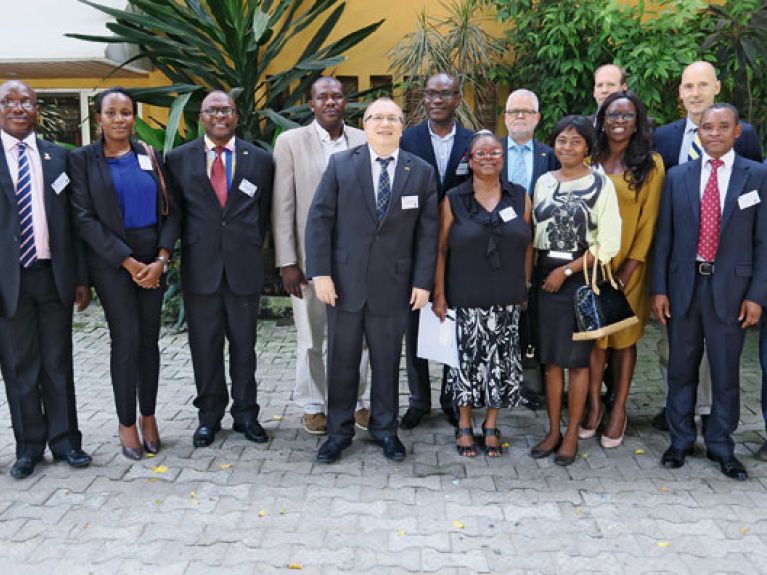Job guarantees through dual vocational training
Nigerian industry has launched dual vocational training programmes with support from German business partners. With great success: trainees who complete the programmes are guaranteed a job.

Robert Malzacher can still remember exactly how the young Nigerian beamed. The young man stood proudly next to the machine he operated every day at the metalworking company in the Nigerian city of Lagos. “Now I have prospects for the future,” he said to Malzacher. That he is able to look ahead optimistically is partly a great coincidence – and in part thanks to a new vocational training programme in Nigeria.
Chance took the young Nigerian to the company on just the right day. He had inquired about a job there. They suggested he take part in an aptitude test for a new vocational training programme that was being held that day. He decided on the spot to participate – and obtained one of the best test scores. Nothing then stood in the way of his dual vocational training.
Combining theory and practice – that’s the idea behind dual vocational training, which has a long tradition in Germany. “That’s definitely one of the reasons why Germany has the lowest youth unemployment rate in Europe,” says Robert Malzacher of the Chamber of Industry & Commerce (CIC) of Giessen-Friedberg in Central Hesse. He is project head of the CIC‘s vocational training partnership with Nigerian business partners. Before the programme was launched, dual vocational training was unknown in Nigeria. It addresses a crucial challenge: “In Nigeria, there are lots of young people who complete their studies and then start work. But they lack practical experience in the workplace,” says project head Malzacher. There are, he admits, various further-education courses available and training options at individual companies. But what is lacking is a vocational training programme that runs for a lengthy period and is recognised by multiple companies.
That’s what led to the idea of an education and training partnership between German and Nigerian partners. In December 2012, the project was launched by the Chamber of Industry & Commerce of Giessen-Friedberg and the Delegation of German Industry and Commerce in Nigeria. It is being implemented in cooperation with Nigerian partner organisations: the Chambers of Commerce & Industry in Lagos, Abuja and Ogun State, along with the Manufacturers Association of Nigeria (MAN) and the Nigerian-German Business Association (NGBA). The Federal Ministry for Economic Cooperation and Development (BMZ) is funding the education and training partnership to the tune of more than 1.7 million euros up to the end of 2018.
The partnership has led to the creation of a one-year vocational training programme in which young Nigerians learn the theory in block instruction over a period of several weeks and in workshops. Beforehand and afterwards, they receive practical training at the workplace. The young trainees can choose between four vocational fields in which they improve their qualifications, thus enhancing their career prospects: Industrial Electronics, Industrial Mechanics, Technical Facility Management and Office Administration.
The instructors working in the programme are Nigerians who have acquired their knowledge from German experts – for example, in a three-week workshop on didactic and technical issues relating to the respective training courses. In role-playing sessions, the Nigerians and their German partners act out typical everyday situations encountered during training.
Passing on this knowledge and experience is the objective of the education and training partnership. The aim is to further reduce poverty in Africa’s most populous country. But the Nigerian side is by no means seeking to exactly copy the German system. “Our Nigerian partners want to find their own model,” says Malzacher. That’s why, for example, they chose the fields for the vocational training programmes. After all, they know best which sectors of industry have the greatest demand for skilled workers. The curricula were jointly developed by the German and Nigerian partners. German experts compiled the initial drafts, which were then revised by the Nigerian partners who have since assumed responsibility for the programme.
The education and training partnership in Nigeria has given lots of young people new prospects. Some 250 Nigerians have already completed their training or are in the process of doing so. Two hundred Nigerian instructors have been trained. And the employers seem to be highly satisfied. When Robert Malzacher visited firms in Nigeria, many of the business owners told him the young trainees were precisely the skilled workers they needed. “I heard the same message again and again: trainees who complete the programme are guaranteed a job with the company,” he says. The vocational training partnership runs until the end of 2018, at which point the Nigerian partners will assume full responsibility for the project. As a next step, the partners intend to make dual vocational training better known in Nigeria. And, in cooperation with government agencies, they want to ensure that dual vocational training is officially recognised. That will help establish it on a lasting basis.
Besides the collaboration in Nigeria, many other ongoing vocational training partnerships in sub-Saharan Africa are being funded by the BMZ. For example, skilled-craft workers in Benin are receiving further training in solar technology. In Tanzania, projects have included setting up car repair shops and developing dual curricula. And in Uganda, a training institute is seeking to improve its training and further training measures in order to better meet the needs of industry. The BMZ is currently providing more than 12 million euros to fund education and training partnerships in sub-Saharan Africa – and more partnerships are planned. ▪
Hendrik Bensch

